Border formalities were completed with unexpected ease, our passports leafed through, puzzled over and stamped, first by a smart soldier in crisp uniform and aviators and then his boss, in a stained, off-white singlet. Both cracked a few ‘jokes’ about whether we would give them the truck. We chuckled politely. We’d learnt by now that to them it wasn’t a joke, it was a long-shot. If we’d been feeling particularly generous that afternoon and in the mood to donate our home on wheels and all our belongings, then it would’ve been silly of them not to ask.
We left them in their tent, empty but for two filthy mattresses and a rickety table littered with stamps. The stamp is a a sign of power and influence in Africa, if you have a stamp or two, you’ve made it. We were heading for the mountain town of Mali-ville, named supposedly for its views across the border into Mali from its highest points.
For a few hours after crossing the the border we continued on the same track, our paper map showing a meandering route all the way to Mali-ville and our iPad mapping showing a variety of tracks, many of which didn’t actually appear on the ground. Throughout Guinea mapping proved a problem, nothing was particularly accurate and very rarely did what we saw on the screen actually correlate with the ground we drove over. As we chugged on we soon found ourselves heading steadily away from our destination and at a fork in the road we branched onto what seemed to be the less used option, placing our trust in maps.me and hoping it would continue in the right direction. As the surface deteriorated our progress slowed, and then the road ended in a bank of head-height grass. In a small clearing to the left were a cluster of simple mud buildings and a group of children kicking a football. They ran over to see who had arrived, a couple of older boys following behind. We explained we were en route to Mali-ville and they enthusiastically pointed on ahead, into the wall of grass, split as we could now see by a track wide enough for a motorbike. We debated our options, turn back and retrace our steps over awful roads or forge on ahead and hope this track opened up.

We pushed on into the thicket, the truck cutting its own path through the grass, twigs and saplings, the larger of which scraped uncomfortably along our underside. In places the ground was charred and lined with ash, luckily for us a recent fire had burnt away a lot of bush, leaving only new growth, small enough to not impede our bumper. After an hour of bush-whacking the motorbike trail finally joined a track wide enough for vehicles. We breathed a sigh of relief and then headed uphill. The map suggested this steep, winding route would crawl its way directly into Mali-ville, high above us.
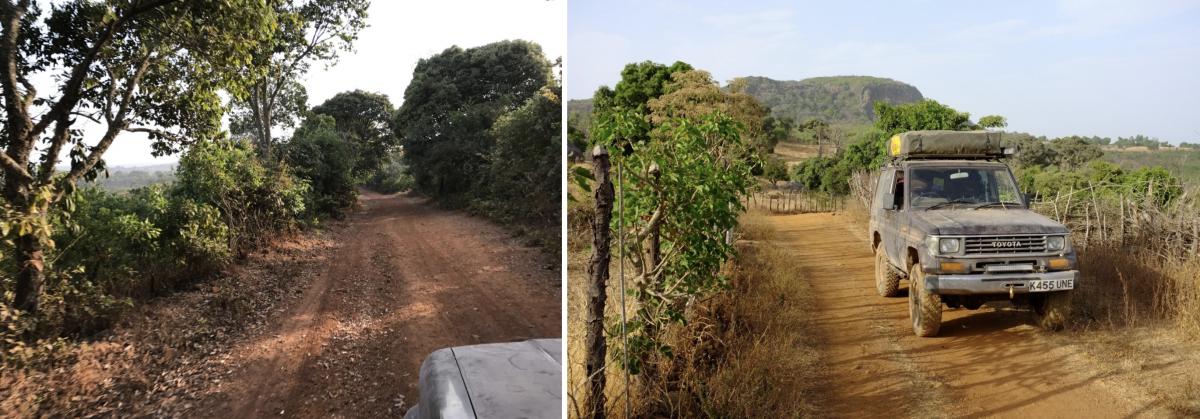
The higher we climbed the worse the track became, the surface was made up exclusively of rocks and boulders with viciously tight switchbacks for added difficulty, the ground falling away into the valley below. In places we got out to pick the easiest route through the maelstrom but as the afternoon wore on and we realised how capable the Land Cruiser was we just pointed it upwards and let it do all the work.

As the sun touched the mountain tops we pulled into Mali-ville and looked for somewhere to stay. The second person we asked gestured over a friend who straddled his moped and led us on a tour of Mali-ville’s dusty streets — lined with shacks, women squatting over smoky fires and children playing in the rubbish, each naked but for a grubby tattered t-shirt. In time, we reached Auberge Indigo, the owner hopped off his moped, introduced himself as Soulymane and showed us facilities; bucket shower and bucket toilet, the Guinean standard.
As we were preparing dinner by head torch the only other guest arrived home and strode over. Marko was a studious looking Finn in a horizontally-striped t-shirt and had worked in the area over the past twenty years for a local NGO trying to improve food security. “Very little has changed unfortunately,” he admitted before excusing himself and retiring to bed.
In the morning we received a visit from a local tourist guide, having heard of our arrival he’d tracked us down in the hope we needed his services. We were the first tourists to visit, he claimed, since Ebola had hit the region, taking the lives of 2536 people. We toyed with the idea of a day trekking in the surrounding mountains but we were unsure of how long it would take to cross Guinea given the state of the roads so far. In the end, we packed up and headed east towards Labé.
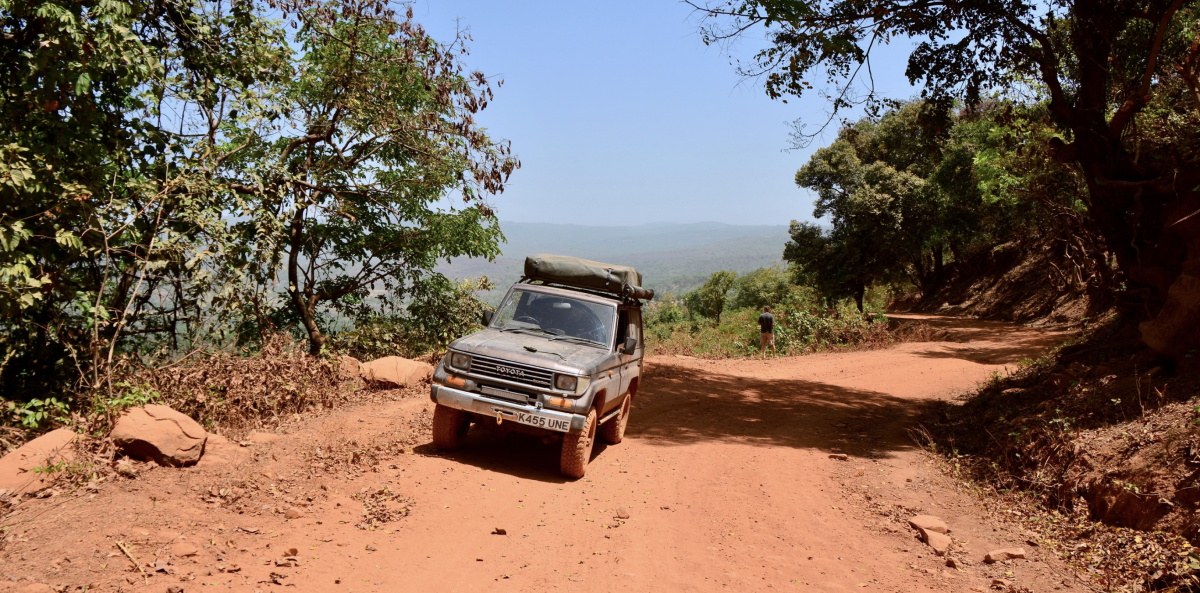
The red dirt wound it’s way out of the mountains and was busy with cars and lorries, all in terrible condition. Loaded down with goods it often seemed like the roof was the only space left for people, their heads wrapped in scarves to keep out the dust.
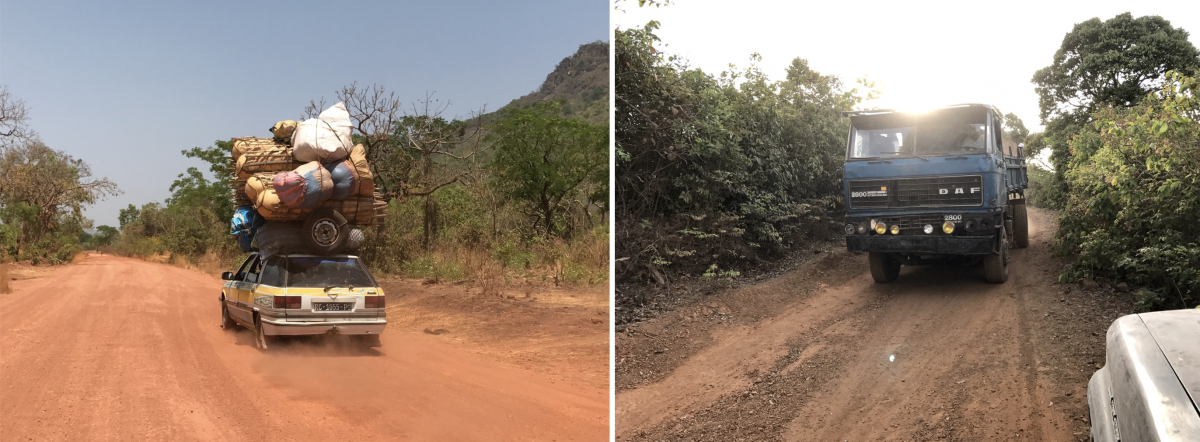
An hour outside Labé we were pulled over at a police roadblock and asked for our documents; passport, driving license, vehicle registration papers and insurance, the usual rigmarole. Disheartened that these were in order the policeman moved onto the next stage; fire extinguisher, warning triangle, first aid kit. With all present and correct and the chance of a bribe quickly fading he made a last ditch effort and poked his head through the open window. A smile spread across his face when he noticed my bare feet. “Where are your shoes?” Without anything better to hand I showed him my flip-flops and the charade was over. We were marched over to his boss, lounging against a tree and gathering money from the other law-breaking travellers arranged in a semicircle around him. I wondered what rule they had broken, the lorry alongside us had no windows or windscreen and on the opposite side of the road a car had pulled over and the driver was dousing the smoking engine with a jerry can of water. Clearly these were considered roadworthy as they drove off as my crimes were explained and the fee set at a few thousand Guinean Francs. After I asked for a receipt awkward looks were exchanged and it was explained that unfortunately they had forgotten the receipt book today. The fee magically reduced and unwilling to haggle over about 4 GBP I paid, put on some shoes and we left.
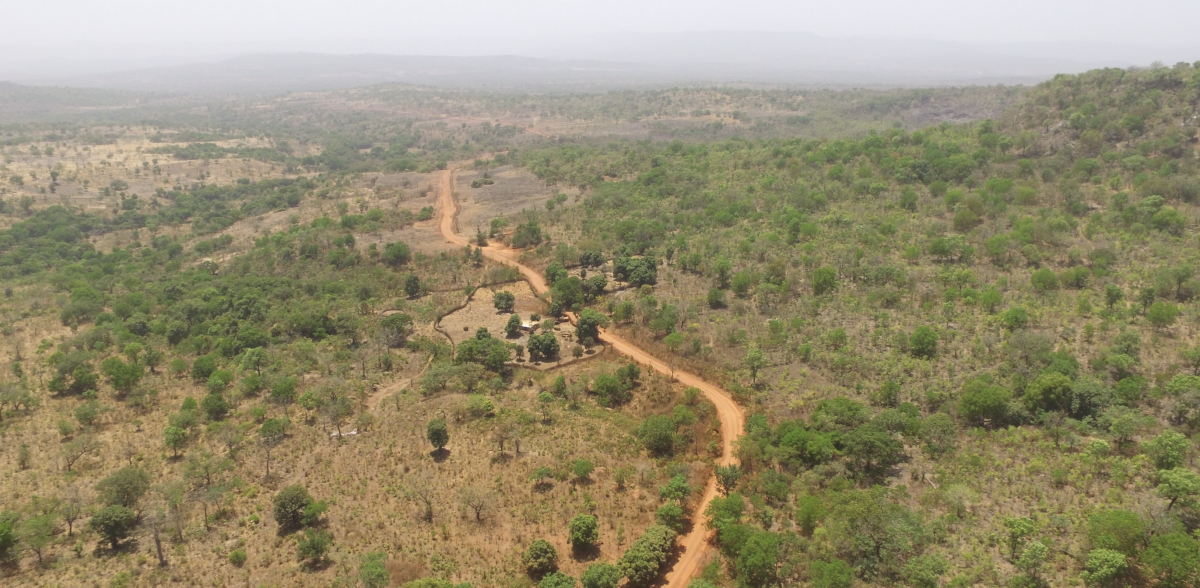
In Labé we stayed at Hotel Tata. It was run by an Italian couple, serving great pizza and seemed to be one of the more upmarket addresses in Labé, well, it had running water. Soon after arriving we got chatting to Gerdette, an Irish woman who had arrived late the previous night after a nightmare fourteen hour taxi ride from Guinea Bissau. We guessed she was in her sixties and over dinner she jumped between the decades regaling stories from all over the world — working as a radiographer in Baghdad during the Iran-Iraq war, crossing Australia on the back of a past boyfriend’s motorbike, she’d married an English protestant much to the horror of her catholic mother and dated a Bulgarian communist. She was in the first week of a west African road trip, travelling only by local buses and taxis before flying out of Ghana to Ireland, then Australia and finally to Alaska to see friends. She always wanted to be a truly global citizen she explained, though it was getting harder nowadays. We were charmed, she was certainly one of the the most optimistic, free-spirited and footloose personalities I’d ever met.
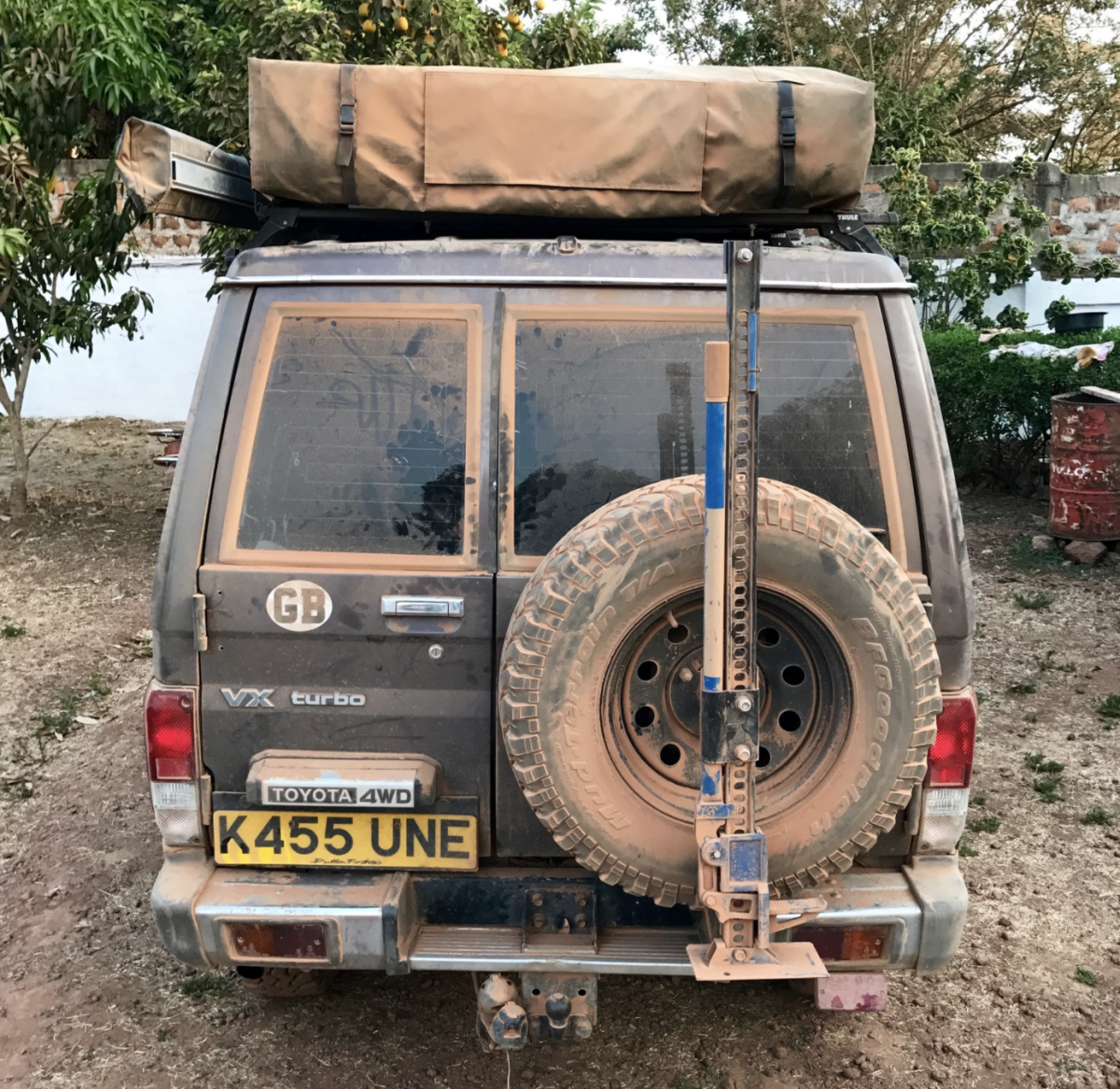
We strolled around Labé the next day getting some jobs done; we got a temporary import permit from the douane (customs) chief himself, sitting behind his huge crescent shaped desk he carefully read the equivalent Senegalese document before scrawling something on the back and stamping it twice. Afterwards we found a bank to stock up on Guinean Francs. Inside it was a microcosm of festive cheer in late-March, ‘Merry Christmas’ in gold spray paint on the glass separating customer from cashier, a gaudily decorated Christmas tree next to the waiting bench and tinsel hearts taped to the walls.
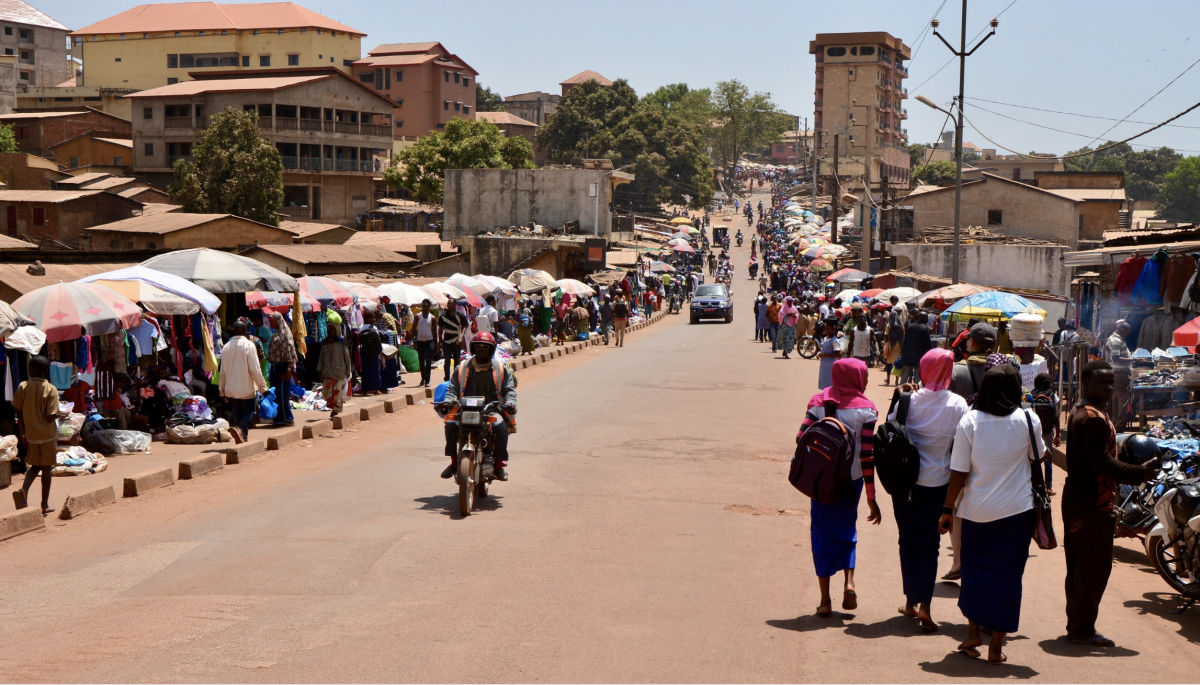
Satisfied we’d got most of the jobs done we took a detour and stumbled upon a labyrinthine maze of covered market stalls, passageways packed high with goods and just wide enough for two people to squeeze by each other. Grouped into sections there were multiple stalls each selling the same items; fabric, brushes, onions, radios, football shirts and Tupperware, to name only a few. I thought back to something Christian had said over beers in his bus. “African markets,” he mused, “a thousand stalls but only three products”.
Set behind the town’s broken down corrugated iron facade, collections of rubbish and rotting car carcasses this souk-like market was the antithesis of the characteristic African scene, an ordered calm with a dizzying range of goods and services, everything one may need found in one place. At first I thought of it as the Guinean equivalent of a Tesco superstore. However, after passing through the fabric stalls we came upon a line of sewing machines working on the same fabric, hand crafting new shirts, skirts, dresses and repairing older sun-tired versions. It struck me how odd our home lives can be sometimes, our clothes stitched in China of fabric made on the other side of the world. In contrast, I thought, the economies of Africa are self sufficient and holistic having evolved ways to fulfil each and every demand. Most of all I felt privileged to be in the middle of a Guinean market, in the middle of west Africa, in perfect safety, observing a way of life that one cannot penetrate in any other way.

By the time we’d returned from town, Gerdette had departed en route to Ghana and we settled down to another evening of pizza, this time without her stories. Instead, a group of six American Peace Corps volunteers in their early twenties arrived, a loan guy mincing along with his harem of five girlfriends, their voices clearly audible before they had even appeared. We were forced to overhear them for the next two hours; favourite cities, best college campuses, discussions about which couple was the cutest and whether their families were going to visit them here, one had a country-hopping granny who couldn’t wait to see Guinea, another’s parents had never left their state. I was explaining to my dad how immersive the Peace Corps experience seemed to be and how much they achieve during their placements when the guy’s voice hit a new decibel peak. “Oh ma gawd, isn’t he just the most fucking adorable guy ever,” he shrieked. Knowing glances were exchanged between the other tables as he rambled on, breathlessly exclaiming how whenever Chad spoke to him he felt like the only guy in the room. A sentiment shared by the girls as well. One explained that, unfortunately, Chad had a girlfriend and was off the market, an announcement met with shocked moans. They left soon after, a calm returned and we spoke with a Mauritanian government official who was in Guinea on business and wanted a tour of the Land Cruiser. “How much?” he asked earnestly.
Our route over the following days took us due east from Labé, we left on the N27 which appeared to be a fairly large east-west route on our maps. It turned out to be a punishing and jarring day, travelling glacially at no more than 5-10 mph for hours with only African bush scrub for distraction. There must have been a better way as the road was little-used by other motorists, however, it was going in the right direction and not wanting to risk getting lost we sucked it up and continued on, crawling over the tyre-shredding rocks.
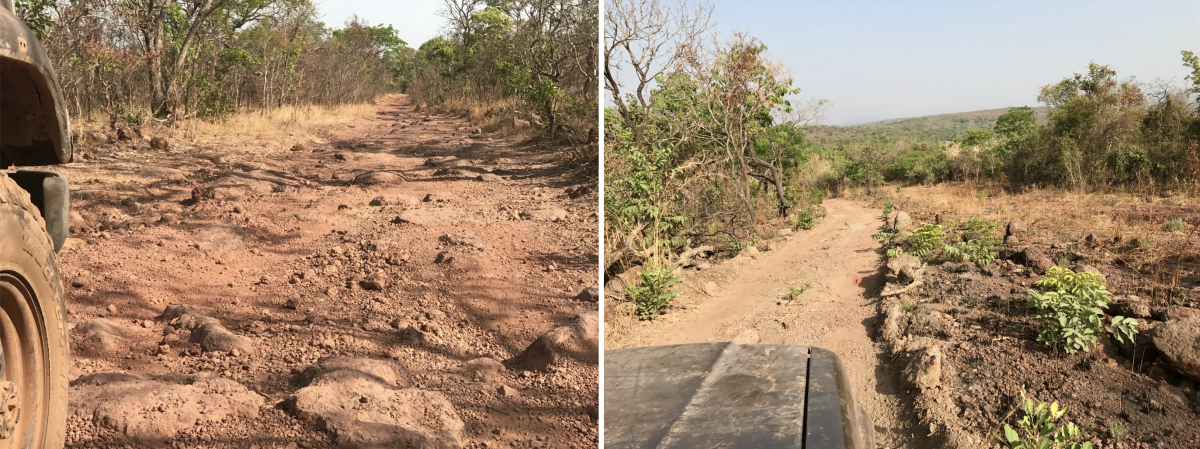
We descended towards the Bafing river and set up camp on it’s banks. In Senegal we’d been able to find campsites, auberges or campements to spend the night but in Guinea, outside the major cities, it was as though tourism hadn’t even been invented. We washed in the river, flew the drone and enjoyed a dinner of fried Spam and onions, no finer camp food!

In the morning we headed for the river crossing, expecting a bridge as shown on the map. One had clearly once spanned the river, many wet seasons ago, but all that remained was a mess of eroded concrete dotted across the flow. Motorbikes were being ferried across in dugout canoes as we waded out to investigate the depth. Without a snorkel the main risk was ingesting water into the air intake and permanently wrecking the engine, something to avoid at all costs. In the end we decided the water level was low enough, even taking into account the strength of the stream, and I successfully inched across, avoiding the biggest of the submerged stones.
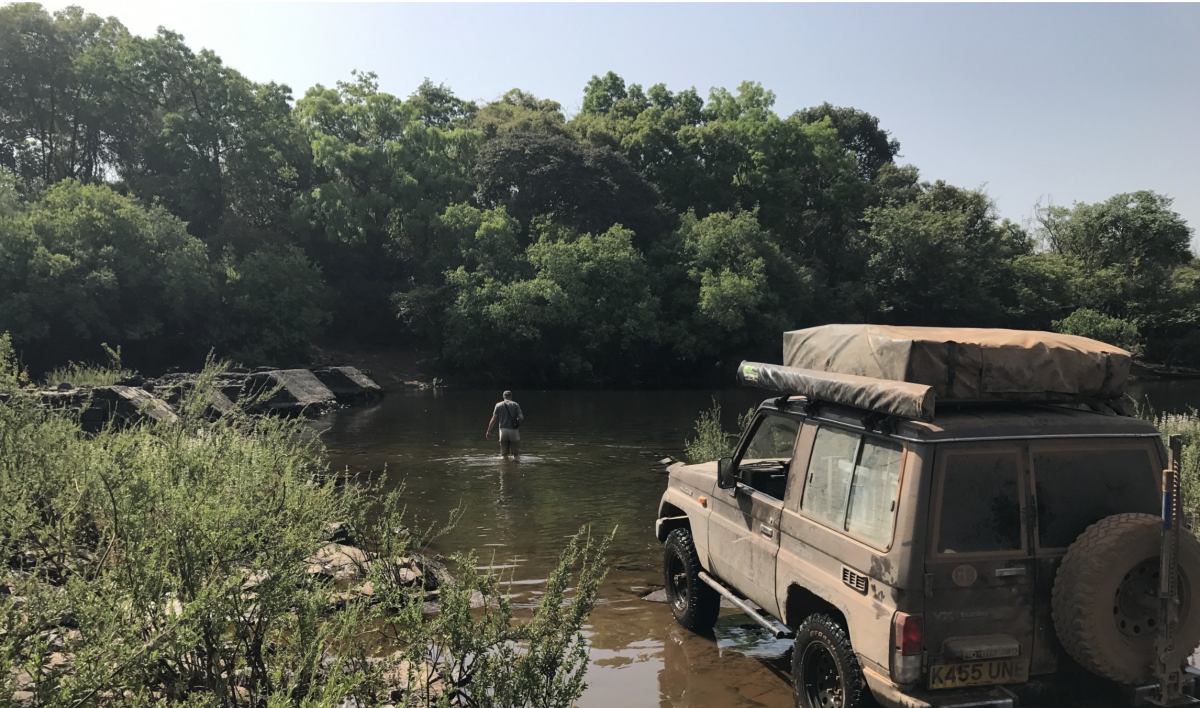
In the next village we stopped for coffee and bought bread, biscuits and some other supplies from the roadside stalls. In the back of the coffee shack the owner had set up a phone charging station with about fifty phones each plugged into an endless series of plugs. From what I could see the only source of power were two solar panels propped outside against the side of the shack. It must have taken hours for the phones to have charged, time their owners could sit and drink coffee. How enterprising of the businessman. While some modernity has crept into west Africa it very much feels like the exception, behind the coffee stall five vultures were pecking at the remains of two cow heads tossed atop a rubbish pile.
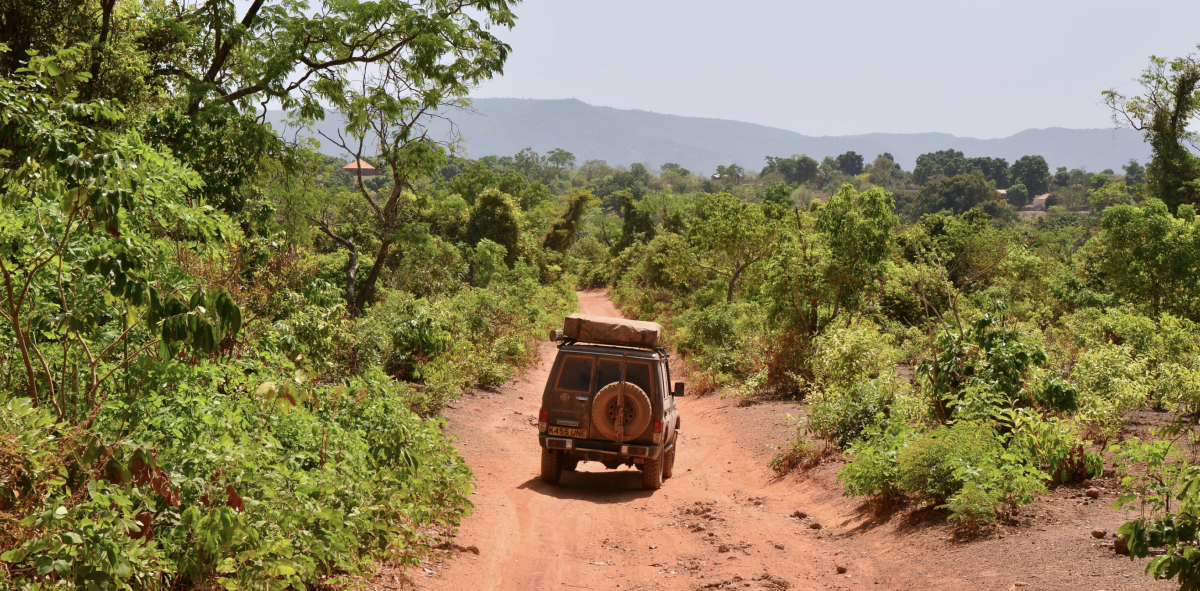
By mid-afternoon we’d joined the N1. It was the best surface we’d driven on since crossing into Guinea, viciously potholed bitumen with edges crumbling into sand, rather than the bucking, jarring rock-gardens of the past days. Pulling off the tarmac we followed a small track towards the Tinkisso river and picked a spot to camp as a couple of fisherman cast their nets into the river. We asked how their day had been and they each fetched sacks — marked USAID, remnants of a previous handout — and showed us the day’s catch. We asked if we could buy one and each came up with their best offering, a foot long catfish narrowly beaten out by a similarly sized trout-looking specimen. Wrapped in tinfoil and cooked over campfire embers it was succulent and tasty. Later we sat reading and plotted out our coming route as the African night played it’s usual tunes, complemented by the warbling gurgle of bullfrogs down by the rivers edge. Another great riverside camp.
The following afternoon we set up camp on the banks of the Niger River. Clearly running low, it was a feeble stream picking its way through a wide expanse of beach, mothers washing clothes as their children splashed around or played football on the sand. We sat and read under the awning all afternoon, popping down to the river to cool off a couple of times. Clearly a strange sight we appeared to be the regions top attraction, everyone who passed took at least ten minutes to stand and take in the spectacle; groups of children barefoot on their way to play football, men wheeling motorbikes down to the rivers edge for a clean and women with stacks of firewood teetering on their heads. As the sun set, throwing ripples of pink and mauve across the sky we looked up to find someone stood a few metres away examining us intently, ironic considering he was, of all the people I’d seen that day, worthy himself of a second look. Barefoot in faded flared jeans, a battered and ripped but fully buttoned up pea coat and a felt cap on which he had balanced a full 25 litter yellow plastic jerry can. After we exchanged pleasantries and went on cooking our dinner he stood hand on hip watching proceedings until, I assume, he’d taken in enough bizarre details to be able to tell a good story over dinner. “You’ll never guess what I saw today,” I imagined him saying later that evening.
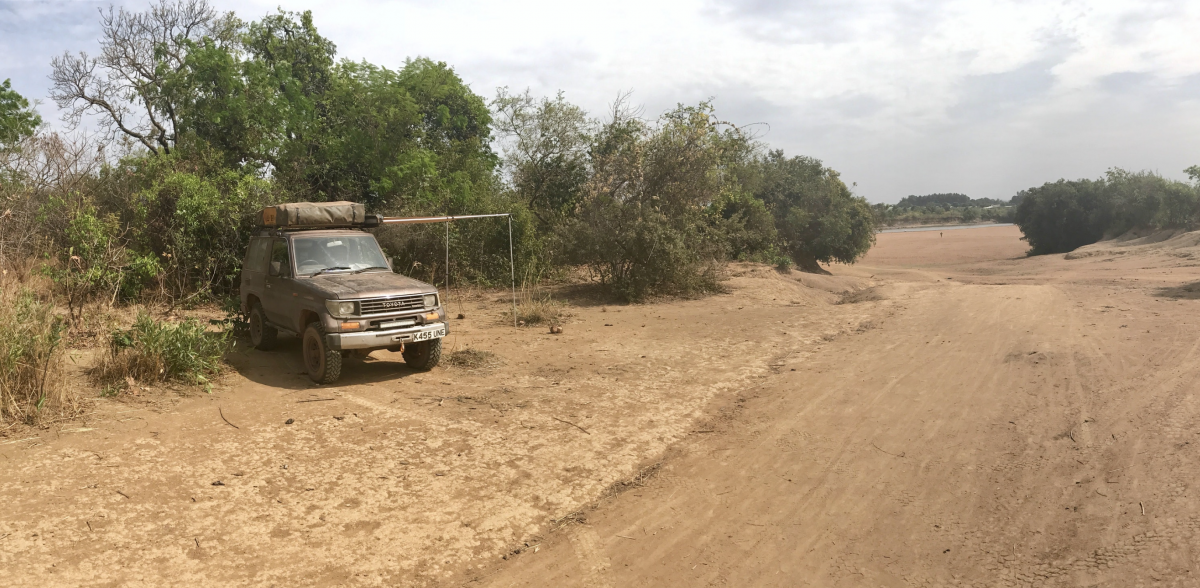
Filling up with fuel in the outskirts of Kankan the next day we got chatting to the driver of a big, yellow American GMC school bus, an unusual sight amongst the more common Mercedes buses and coaches. The owner was loud and gregarious with one gold front tooth, the other brown, flaky and rotting away. We compared our rides and he explained he’d put a new engine in it at 300,000 miles, a few years ago. For a bus with nearly half a million miles on it if was in remarkably good shape. He was very excited to hear we’d come all the way from London and turned to his bus full of passengers, and the forecourt at large, to announce us to everyone.
Afterwards, we continued on further into the chaos of downtown Kankan and found somewhere for lunch. The extensive menu handed to us turned out to be for show, there was only omelette on offer. Having had omelette for lunch the previous day we reluctantly agreed, pointing to the other options on the menu was met with a firm no. To our complete surprise, what arrived in no way resembled an omelette. A freshly baked triangular focaccia-type bun was stuffed with fried onions, mince, chips, cheese, ketchup, mayonnaise, finished with an omelette on top. All in all, it was one of the most unexpected and pleasant meals of the trip. When we thanked him enthusiastically and paid he looked taken aback, incredulous that two Europeans would have enjoyed, and not just tolerated, eating in his restaurant.
As we drove on we considered how we’d changed now that we were approaching 5000 miles and five weeks on the road. We now felt able to penetrate the ramshackle, dusty, barefoot and oil-soaked African exterior and see the detail beneath. We both began to recognise friends from back home in the faces we passed, the subtle curve of beauty in a passerby and the search for lunch or petrol became quicker once we were able to better read the streets. The battered, rust-caked, squeaky vehicles are more of a biography when you know the owner-driver has racked up nearly half a million miles behind the wheel and had to replace the engine to keep it running because it’s his only bus and only means of income.
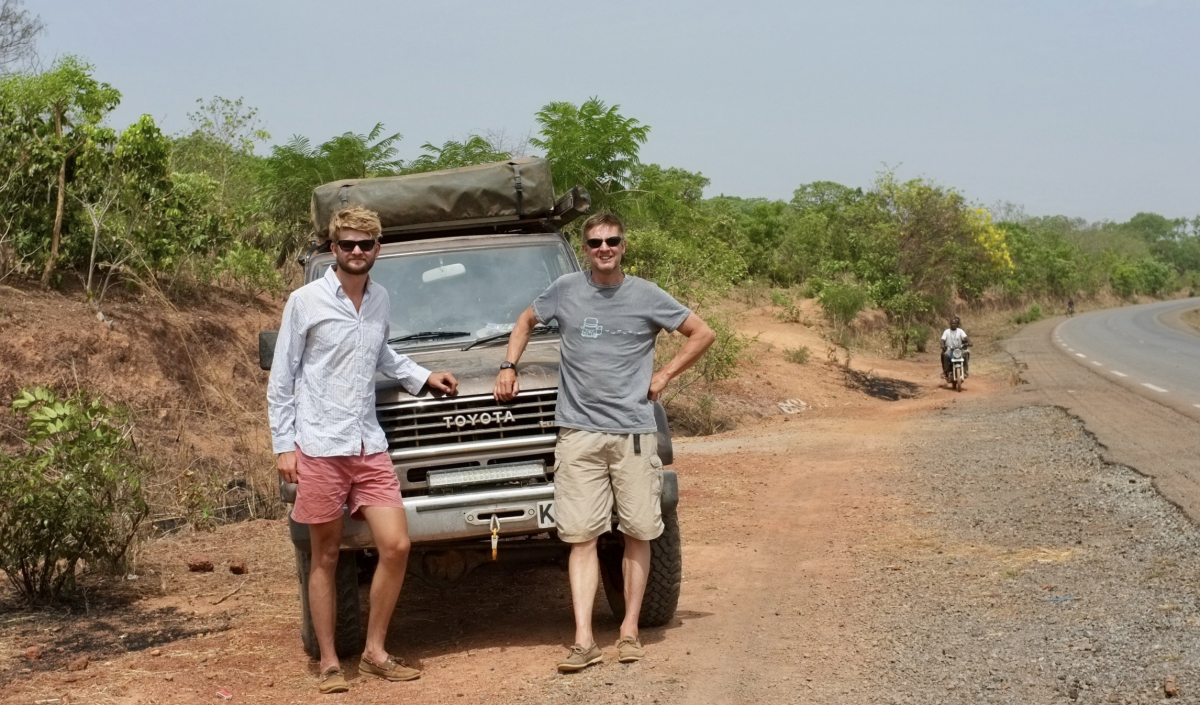
Our last river camp in Guinea was on the banks of the Sankarani. It was a river I knew well. Just forty miles north the river formed the border between Guinea and Mali as it ran past the gold mine where I worked. I’d spent many an enjoyable evening overlooking it, drinking beer and watching the sun set with colleagues.
Now we pulled off the dirt road and paralleled the river looking for somewhere quiet to camp. We’d learnt to try and avoid people at this point, if no one saw us arriving then generally we wouldn’t get bothered later on in the day. We set up the awning for some shade, cooled off in the river and set about an afternoon of reading and tea-drinking. The tarmac N1 had put us ahead of schedule and these last days in Guinea we were able to pull up after lunch and spend the afternoons relaxing. Like the Niger, the river was running low, exposed sandbanks dotted in-between deeper channels. As the sun creeped towards the horizon we carried a pile of firewood and our chairs out to one of the sandbanks, lit a fire and cooked up dinner. Knowing we’d be arriving at the mine the next day and the journey almost over, we looked back on five brilliant weeks; the places we’d seen together and the people we’d met.
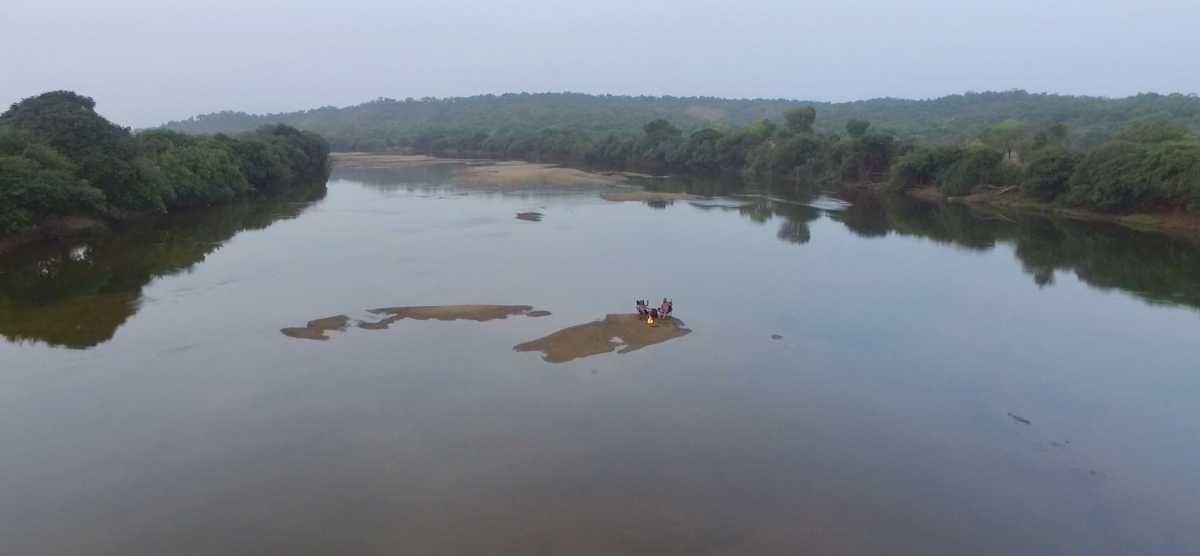
The last major obstacle in Guinea was to cross the Sankarani, shortly after this the border beckoned. Before pitching camp the previous day we’d driven to the crossing point and noted a large vessel mored up on the bank, clearly for ferrying vehicles across, or so we thought. Now, stood on the bank we cursed ourselves for not investigating further as it became abundantly clear that it was rusted and broken, lying impotent — the only way across was on set a pirogues, strapped together and covered in wooden planks. Fifth in line it took over two hours until our turn to board, ourselves and the other cars delayed further as motorbikes seemed to have priority. At least the motorbikes added some comedy. Each time the pirogues docked on either bank there was a noisy, smoky, engine-revving rush to disembark down a narrow slippery wooden plank and undoubtably someone would misjudge it and tumble into the river. Luckily we embarked and disembarked without incident, gliding across the river we looked the quintessential picture of African exploration; a dusty Land Cruiser floating along under a perfect sky.
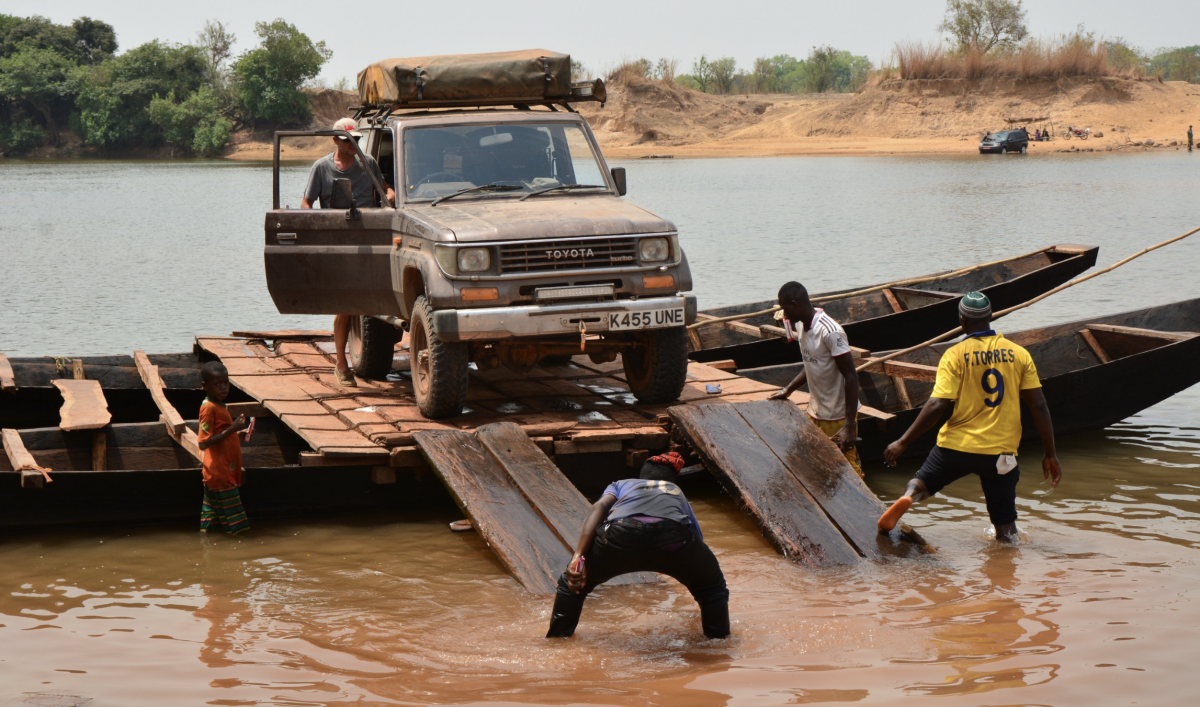
A little further on we came upon the Guinean border, were passed between the douanes and gendarmes and then sent on our way. We continued on down the same track expecting to reach the Malian equivalent but nothing appeared. We were sure we couldn’t have missed it — we’d clearly reached an even more lackadaisical country where borders weren’t even acknowledged — and so carried on hoping we could get our passports stamped in Yanfolila, the first big Malian town we’d come across.
We’d made it to Mali!